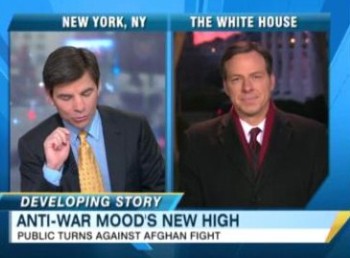
ABC News reported on the public's decreasing support for the Afghan War. (Credit: ABC News, screenshot detail)
According to the latest ABC News/Washington Post poll, six of ten Americans now say the war in Afghanistan has not been worth fighting. According to the pollster, Gary Langer, that result “is a grim assessment – and a politically hazardous one.”
It is in the nature of the news media to exaggerate the implications of the news they report, or – as in this case – the news they generate on their own. Poll findings are particularly susceptible to this hyperbole effect, because poll results are inherently subjective – the questions are an “art” form, and the resulting percentages are subject to a myriad of interpretations.
 How serious is the public’s disaffection with the war for Obama? While ABC News suggests it’s a downright minefield, that conclusion is not supported by other questions in its own poll. And if other polls are considered, the Cassandra-like warning from ABC News seems a bit over-the-top-frantic.
How serious is the public’s disaffection with the war for Obama? While ABC News suggests it’s a downright minefield, that conclusion is not supported by other questions in its own poll. And if other polls are considered, the Cassandra-like warning from ABC News seems a bit over-the-top-frantic.
Different Question Wording
Let’s look at a different way of investigating whether the public is disaffected with the war in Afghanistan. As the chart shows, question wording makes a major difference in how polls assess public sentiments about the war.

See above a comparison of the polls by media outlets the past two months on the war.
Instead of asking if the war has been “worth fighting,” as does ABC News, Gallup asks if going to war was a “mistake.” With that phraseology, Gallup reported last month that only 39% had a negative view of U.S. participation in the war, compared with ABC’s 59%.
On the other hand, in October CNN found 58% of Americans who “opposed” the war in Afghanistan, compared to 37% who “favored” it – a net negative assessment comparable to what ABC News found.
Back to the other hand: At the beginning of this month, Pew announced that 49% of Americans believe the United States will succeed in Afghanistan, while 39% expect the U.S. to fail – a more negative assessment than last year’s, though still net positive by ten percentage points.
If we want a picture of the public that is somewhere in between the extremes of these polls, we have only to look at last month’s Quinnipiac poll: 44% of their respondents believe the U.S. is “doing the right thing” by fighting the war in Afghanistan now, while 50% say the U.S. shouldn’t be involved now – a slightly negative net assessment of six percentage points.

See above the results of the Quinnipaic poll. (Credit: PollingReport.com)
So, what do we make of these contradictory results, all within a relatively narrow period of time? The differences do not reflect opinion changes over the past several months. Individual polls in fact show a relatively stable opinion, when the same questions are asked.
What we find is that slight difference in question wording makes a big difference in how we perceive the public’s view of the war – from a net positive of 19 percentage points (Gallup) to a net negative of 28 points (ABC News), and three other polls in-between.
When question wording is so influential, the results suggest a largely inattentive public.
Inattentive Public
That the public isn’t paying much attention to the war in Afghanistan is revealed in the ABC News poll itself. Unlike the other polls, the ABC News poll included an intensity measure with some questions (whether the respondent felt “strongly” or “somewhat” about the issue). The poll analysis, however, simply ignores the results of the intensity measures, though they provide useful insights.
For example, one question asks whether people support or oppose Obama’s increase of 30,000 troops to Afghanistan. ABC News reports a tie at 48% for each option. This implies that 96% of Americans have an opinion on this matter. That would be an incredible show of public engagement in the issue.
The intensity measure, however, suggests that a majority of the public is really ambivalent about the issue, not seriously caring whether there was a troop increase or not. Just 22% “strongly” supported the increase, while 24% “strongly” opposed it, with 50% who said they only “somewhat” supported or opposed the increase, and another 3% who had no opinion at all.
These figures show that over half of the public – around 53% — simply had no meaningful opinion on the issue. That figure isn’t surprising. People have so much going on in their lives that giving careful attention to all of the public issues facing this country simply isn’t doable for many people.
Similarly, when asked whether people approve or disapprove of Obama’s handling of the situation in Afghanistan, the results show a virtual tie – 45% approve, 46% disapprove. Do 91% of Americans really have a meaningful opinion about Obama’s Afghan war policy? Not likely – as the intensity measure reveals. Just 17% strongly approve, 30% strongly disapprove, and 44% only “somewhat” approve or disapprove, with another 10% who have no opinion at all book.
These figures suggest, again, that over half the public – 54% — simply have no meaningful opinion about Obama’s war performance.
Pollsters’ Hyperbole
When pollsters provide figures that suggest the vast majority of Americans have meaningful opinions on an issue, it’s worthwhile taking a second look. In most cases, the indication of such an extensive public engagement is simply wrong. And when pollsters make claims about the future – how those opinions will affect the political environment – we need to be doubly skeptical. It’s hard enough trying to describe the present. Predicting the future is a fool’s errand.
David W. Moore is a Senior Fellow with the Carsey Institute at the University of New Hampshire. He is a former Vice President of the Gallup Organization and was a senior editor with the Gallup Poll for thirteen years. He is author of The Opinion Makers: An Insider Exposes the Truth Behind the Polls (Beacon, 2008; trade paperback edition, 2009). Publishers’ Weekly refers to it as a “succinct and damning critique…Keen and witty throughout






Comments Terms and Conditions